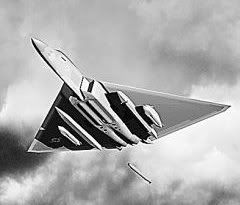there is alot of discussion going on about whether the super hornet will be suitable to replace the F-111 in the interim. Could someone please shed some light as to whether a dedicated bomber such as the B-1 bomber was considered or still should be considered to maintain Australias strategic long range deterrent? it was just a thought...
surely a mix of say 75 x F-35 (including a squadron of VSTOL variants for the new LHD's) and a squadron of dedicated long range strike bombers should be considered? i would like to hear everyones opinions

and on another note - will the newly elected Rudd government push harder for F-22? or has the US given everyone the stiff arm jab regarding this aircraft.
Cheers
With regards to the SH (or JSF) acting as a replacement for the F-111, one must remember the context in which it would be used. With the development of advanced PGMs, much of the range available to an F-111 can be achieved, and with the progress made in weapon accuracy, smaller warheads can have the same impact as large bomb loads. That is part of the reason for the development of the SBD, since it was found that a larger (2,000lb for example) bomb was sometimes undesirable do to having too large an area of effect.
In the Australian context, in what situation would there be a need for an intercontinental strike? That would likely be the only time there would be a need for a strategic bomber as replacement, given that things like JSOW-ER is to have sometime like a 600km range, and JASSM-ER in the neighborhood of 1,000 km. Also, if Australia decided to get a bomber as a replacement, from whom would they be gotten? AFAIK, there are no modern bombers (aside from perhaps Tu-160) still in production, and the aircraft which might be available in boneyards would be very different in terms of size to the F-111 as well as performance. The US is looking at a new/replacement strategic bomber, but given US doctrine, such an aircraft (if even available to Australia) would most likely not be something of interest. The FB-22 if it ever makes if off the drawing board, is the most similar to an F-111 successor and could perhaps have a place in the RAAF. Maybe.
As for Australia, or anyone else getting the F-22 for that matter... It might happen, but I would recommend neither holding ones breathe or planning on it. I will unfortunately need to dip somewhat into politics to explain my reasoning and some of the background, but I will attempt to keep it to a minimum.
In order for some country aside from the US to order the F-22, it would need to follow the FMS (Foreign Military Sales) program through the State Dept. I will avoid going through that in too much detail, as I suspect a number of members are far more familiar with it (and likely first hand knowledge) but FMS requires that the State Dept sign off/approve a sale, and then submit it to Congress for approval, prior to the sale being completed. Given the sensitive tech involved, it would likely be difficult to get the sale far enough along for the State Dept to approve it and send it to Congress, nevermind the political hot potatoe issue such a FMS sale would create there. In addition, and specific to the F-22, Congress (as I read the Congressional Law Library record) has passed laws making it illegal to spend money to sell the F-22. Congress (which enacts laws and controls the budget), in making it illegal to spend selling the F-22 in effect made it impossible for the State Dept. to conduct do the FMS approval to allow a possible sale to be sent to Congress for approval. Essentially as I read it, the FMS and related sections of the US Code are forced to be left in place.
Getting into the politics of the situation, the law which prevents the expenditure could of course be repealed. However, there would be a real political cost to do so, since whichever side decided to lift some of the restrictions would likely be cast as selling US technical advantages. As such, I believe that the political damage members of Congress would face is unpalletable. IMV, the best chance for the F-22 to have been available to US allies would have been between 2001-2006. Also, I do not anticipate any change in administration making a difference, since there is only a change in the Executive branch. If there had been issues within that branch of government (like State Dept dragging out approval) an admin change could effect that. However, at present it seems that it is not able to go forward far enough.
-Cheers

